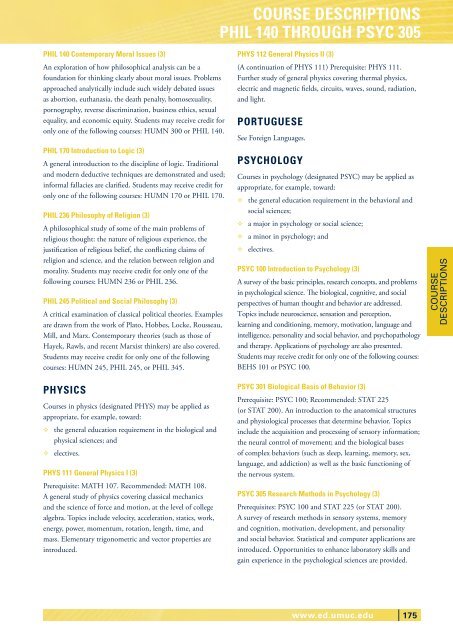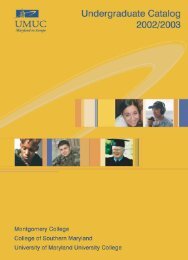UNDERGRADUATE CATALOG - UMUC Europe
UNDERGRADUATE CATALOG - UMUC Europe
UNDERGRADUATE CATALOG - UMUC Europe
You also want an ePaper? Increase the reach of your titles
YUMPU automatically turns print PDFs into web optimized ePapers that Google loves.
PHil 140 Contemporary moral issues (3)<br />
An exploration of how philosophical analysis can be a<br />
foundation for thinking clearly about moral issues. Problems<br />
approached analytically include such widely debated issues<br />
as abortion, euthanasia, the death penalty, homosexuality,<br />
pornography, reverse discrimination, business ethics, sexual<br />
equality, and economic equity. Students may receive credit for<br />
only one of the following courses: HUMN 300 or PHIL 140.<br />
PHil 170 introduction to logic (3)<br />
A general introduction to the discipline of logic. Traditional<br />
and modern deductive techniques are demonstrated and used;<br />
informal fallacies are clarified. Students may receive credit for<br />
only one of the following courses: HUMN 170 or PHIL 170.<br />
PHil 236 Philosophy of Religion (3)<br />
A philosophical study of some of the main problems of<br />
religious thought: the nature of religious experience, the<br />
justification of religious belief, the conflicting claims of<br />
religion and science, and the relation between religion and<br />
morality. Students may receive credit for only one of the<br />
following courses: HUMN 236 or PHIL 236.<br />
PHil 245 Political and social Philosophy (3)<br />
A critical examination of classical political theories. Examples<br />
are drawn from the work of Plato, Hobbes, Locke, Rousseau,<br />
Mill, and Marx. Contemporary theories (such as those of<br />
Hayek, Rawls, and recent Marxist thinkers) are also covered.<br />
Students may receive credit for only one of the following<br />
courses: HUMN 245, PHIL 245, or PHIL 345.<br />
PHysiCs<br />
Courses in physics (designated PHYS) may be applied as<br />
appropriate, for example, toward:<br />
G the general education requirement in the biological and<br />
physical sciences; and<br />
G electives.<br />
PHys 111 general Physics i (3)<br />
Prerequisite: MATH 107. Recommended: MATH 108.<br />
A general study of physics covering classical mechanics<br />
and the science of force and motion, at the level of college<br />
algebra. Topics include velocity, acceleration, statics, work,<br />
energy, power, momentum, rotation, length, time, and<br />
mass. Elementary trigonometric and vector properties are<br />
introduced.<br />
CouRsE dEsCRiPtions<br />
PHil 140 tHRougH PsyC 305<br />
PHys 112 general Physics ii (3)<br />
(A continuation of PHYS 111) Prerequisite: PHYS 111.<br />
Further study of general physics covering thermal physics,<br />
electric and magnetic fields, circuits, waves, sound, radiation,<br />
and light.<br />
PoRtuguEsE<br />
See Foreign Languages.<br />
PsyCHology<br />
Courses in psychology (designated PSYC) may be applied as<br />
appropriate, for example, toward:<br />
G the general education requirement in the behavioral and<br />
social sciences;<br />
G a major in psychology or social science;<br />
G a minor in psychology; and<br />
G electives.<br />
PsyC 100 introduction to Psychology (3)<br />
A survey of the basic principles, research concepts, and problems<br />
in psychological science. The biological, cognitive, and social<br />
perspectives of human thought and behavior are addressed.<br />
Topics include neuroscience, sensation and perception,<br />
learning and conditioning, memory, motivation, language and<br />
intelligence, personality and social behavior, and psychopathology<br />
and therapy. Applications of psychology are also presented.<br />
Students may receive credit for only one of the following courses:<br />
BEHS 101 or PSYC 100.<br />
PsyC 301 biological basis of behavior (3)<br />
Prerequisite: PSYC 100; Recommended: STAT 225<br />
(or STAT 200). An introduction to the anatomical structures<br />
and physiological processes that determine behavior. Topics<br />
include the acquisition and processing of sensory information;<br />
the neural control of movement; and the biological bases<br />
of complex behaviors (such as sleep, learning, memory, sex,<br />
language, and addiction) as well as the basic functioning of<br />
the nervous system.<br />
PsyC 305 Research methods in Psychology (3)<br />
Prerequisites: PSYC 100 and STAT 225 (or STAT 200).<br />
A survey of research methods in sensory systems, memory<br />
and cognition, motivation, development, and personality<br />
and social behavior. Statistical and computer applications are<br />
introduced. Opportunities to enhance laboratory skills and<br />
gain experience in the psychological sciences are provided.<br />
www.ed.umuc.edu 175<br />
CoURsE<br />
dEsCRiPTions






